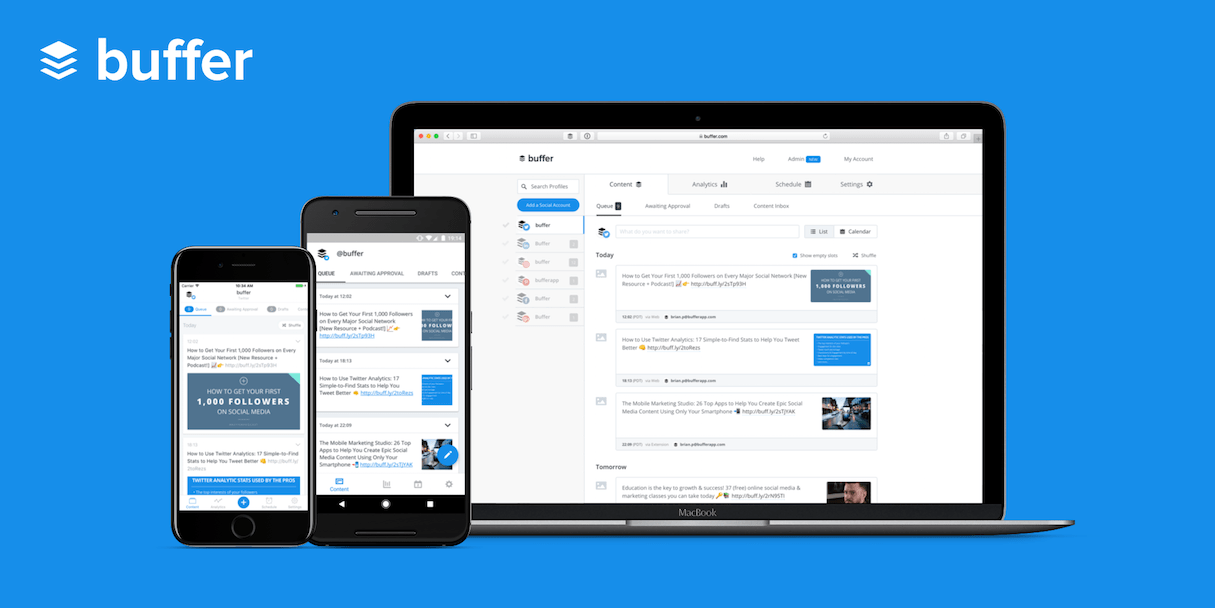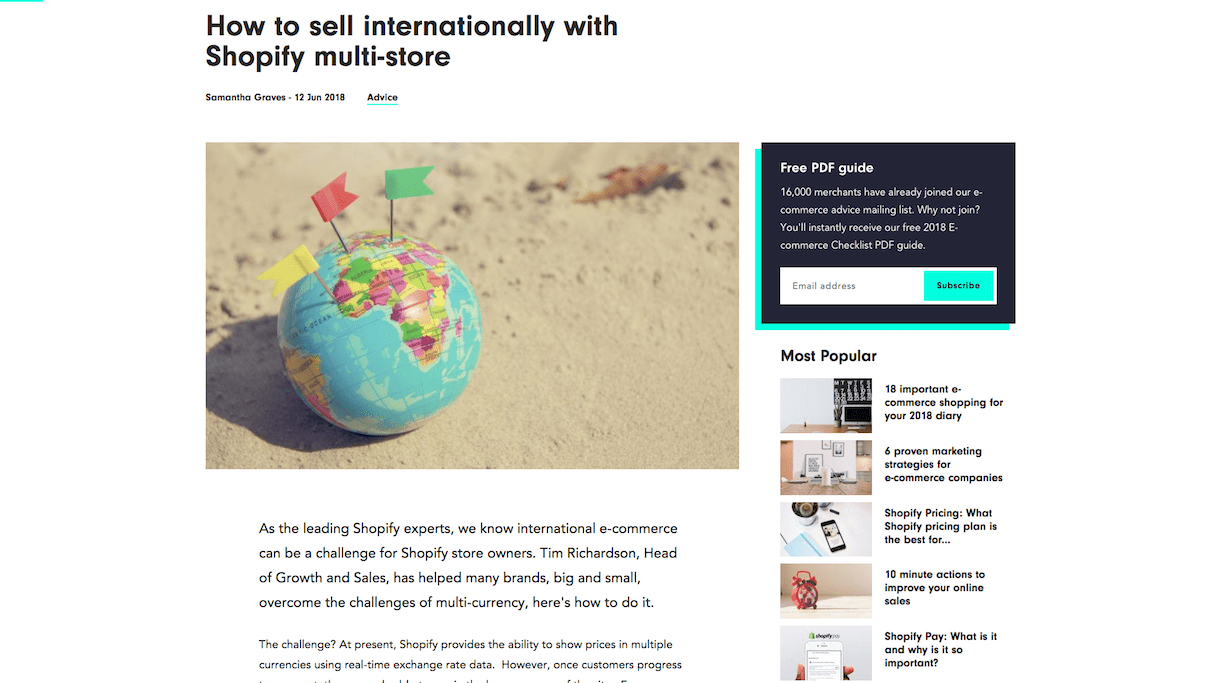
As a freelancer or small agency you need to balance many different tasks. The main priority, you may argue, is your design and development work to build up a strong portfolio and continue bringing in agency or freelance work, but you also need to take care of bookkeeping and accountancy, drawing up contracts and figuring out the right pricing model for your work, and more. Chances are you’re always strapped for time.
However, one area you should be careful to not neglect is the marketing of your business . Marketing may not come naturally to you, but it’s crucial if you want to attract more and better clients. And if you create apps or online services as an income stream, you’ll want to make sure that what you design and build is seen and used.
. Marketing may not come naturally to you, but it’s crucial if you want to attract more and better clients. And if you create apps or online services as an income stream, you’ll want to make sure that what you design and build is seen and used.
If you market your business right, you can grow it from landing your first client to going full-time, start subcontracting or employing people, and maybe even found an agency if that’s what you aspire to. It’s a busy market—you’re competing with big businesses, freelance marketplaces, and an army of freelancers. Pay proper attention to marketing, and you’ll stand out and get yourself noticed.
Luckily, marketing can be anything from your social media presence, to how you present previous work online, to how you interact with others in your industry. We talked to some leading consultants, co-founders, creative directors, and designers to find out how they approach their marketing strategy. Here are 10 ways you should consider.
You might also like: Building a Business that Works for You and Not the Other Way Around.
1. Embrace the small business
Your agency may be tiny, or maybe it’s just you, but that’s okay—you can still have a strong small business marketing strategy.
“Don’t be embarrassed that you’re a small business,” warned user experience consultant Paul Boag. “Too many freelancers try to hide the fact that they’re a one-man band, but that’s a mistake. People buy from people. If they like you, trust you and are confident in your ability to deliver, that’s all that matters.”
In fact, there are advantages to being a small business.
“Sure, bigger agencies have some advantages,” said Paul, “but they have disadvantages too. They are expensive and typically come with layers of management. Many clients want direct contact with the person doing the work, and that’s where you will win every time. There is no need to hide that.”
Tell your story
As a small business, there’s power in sharing your story with potential clients, whether that's through social media, your email marketing, or in your in-person interactions.
“Build a brand around yourself,” Paul suggested. “Don't be afraid to be yourself and put yourself out there. Not everybody will like your approach, but that is okay. The web is a large place, and there will be ample people who like how you do things.”
Freelance web designer and digital consultant Dave Ellis, author of Go Freelance, advised to be honest about your story throughout your marketing efforts.
“How did you get where you are today? What’s unique about you and your journey? Plenty of big business deals have been done over the years on the strength of relationships and friendships—and not a huge amount more. You can tell your story very simply by talking about your other hobbies and interests on your about page, but it’s far more effective when your story is present in all that you do.”
You might also like: Client Onboarding: How a One-Man Agency Qualifies Leads and Turns Them Into Clients.
2. Don’t think of your business as small
Jeremy Watt, co-founder of commerce design studio and Shopify Experts Up Later Than You, favors a slightly different approach. Small business owners often get trapped in the ‘small business’ mindset, he said.
“Even if you’re a one-person operation, it’s important to think big. Where at all possible, shed the freelancer mentality with all your business’ touch points. Start with the name of your company, your website’s URL, your social channels and even your email address—a gmail.com email can only get you so far.”
“When you’re a freelancer, one of your huge advantages over larger agencies is the attention to detail you bring to your work. While you’re thinking big, it’s important to make the client feel that you’re still going to provide that extra bit of care to their project. Big city marketing paired with small town communication is a great way to think about the balance you should be aiming to hit.”
You might also like: 3 Simple Ways Your Agency Can Use Content Marketing to Build a Better Brand and Find New Clients.
3. Keep an active and automated social media presence
Tracy Osborn, designer, developer, and author of the Hello Web Books, is a solo business owner, and found it hard to coordinate blogging and keeping an active social media presence when she started out, though she understood the importance of social media marketing.
“First, I worked on partnering with other businesses to provide content for my own blog, so I didn't have to write content from scratch,” she remembered. “Plus, the guest posters were likely to promote their posts, which gave me links and traffic.”
Tracy also automated her connections to social media, so whenever a blog post is released, it's automatically posted on all her social networks.
“I use a custom title, which I can set in WordPress,” she explained. “Then I schedule a few more follow-up posts using something like Buffer. Getting a system in place and automating as much as possible helped me grow and maintain the blog while also doing everything else—design, programming, sales—for my startup.”

4. Keep your social media accounts clean
Freelance creative director Shane Mielke, author of Launch It, stressed that your personality and how you are perceived will effect if a company or an individual person might hire you for a project. This ultimately influences your income and the type of projects you receive. So the personality and the persona that you publicly portray needs to be viewed positively by as many groups as possible, from your LinkedIn to your Twitter, and so on.
by as many groups as possible, from your LinkedIn to your Twitter, and so on.
“Keep your social media accounts clean of sensitive topics by focusing exclusively on promoting your work, skills, personal projects, new tools you’re exploring and positive networking,” Shane advised. “Only engage in positive industry related discussions that benefit you professionally. Treat your posts as curated marketing messages coming from a large company. What would you say if you were a large agency sending out a weekly or monthly company newsletter?”
It’s likely that people followed or contacted you because they liked your work, personal design style, skills, or you were referred by someone.
“Few people or companies want to see or hear political views, rants on personal topics, negativity towards the industry or heated opinions about specific tools which they might use internally. While sensitive polarizing comments might be viewed positively by 50 percent of your followers, they can possibly leave a bad impression for the other 50 percent, which might mean an unfollow, no follow, or that they never want to work with you. You could lose a potential client or project. So it pays to keep your side of the street clean to maximize your business potential.”
5. Focus on content marketing
Alex O’Byrne, a co-founder at Shopify ecommerce agency We Make Websites, recommended including content marketing in your marketing plan, because freelancers are normally short on time but rich in knowledge.
“First, you need to decide on a niche that you can own, which might be a certain platform, industry, area, or type of client that you specialize in,” he suggested. “The narrower the niche the better, because it's easier to be the best at it.”
Alex advised building an email list with everyone you know professionally. “Create articles that provide genuine value to your niche audience. No hard sell. Consider video and podcasts, beyond just written content. Build an email list with everyone you know professionally, then distribute your content through your list, social media, and Google (that is, by publishing on your blog). New people will discover, follow, and subscribe to you. This way, you build an audience that appreciates and trusts you—and one day will buy from you."

6. Share your work online
“Make sure you always share the work you're doing online,” advised UI and UX designer Laura Elizabeth, creator of client-portal.io.
“Post work-in-progress screenshots on Twitter or Facebook, or describe a problem that you've managed to overcome. Don't wait until the project is finished before you're sharing—you never know who's watching. I've had a ton of new clients just from work they've seen on Twitter.”
Laura also suggested creating in-depth case studies for each project you work on and pitch them as guest posts for popular blogs that your clients are reading.
“If you're designing an ecommerce website, for example, show how you've designed the website to optimize for conversions, and provide actionable ways your target clients can improve their ecommerce experience. When the people reading these articles need some help on their website, they'll want to work with the expert, and that’s you!”
7. Set up local meetups
Initially, Tracy Osborn primarily worked with other small businesses. She discovered that one of the best ways to market her business was by forming local meetups.
“As I traveled, I would contact businesses in the area and offer to buy them wine, beer, or coffee at a local spot,” she explained. “There was no agenda—just an opportunity to meet me as well as other local businesses. Years later, the folks I met in person have been my longest running customers and the biggest advocates for my business. Definitely something that is hard to scale, but such a great thing to do when starting out and working on building those connections.”

8. Focus on a single marketing channel
As a freelancer, your time is limited. Digital consultant Dave Ellis explained that since you can’t compete with businesses when it comes to marketing across a broad range of channels, you can more than hold your own if you focus on a single channel, whether that's social media, email, or search engine optimization.
“Pick an area you know well and commit to it,” he suggested. “If you're good on social, go with that. Know SEO? Focus your efforts there. If marketing has never been your thing, then go for the often underrated word of mouth.”
You'll have far more success with a focused approach, Dave advised, than you will going broad and spinning plates in areas that you don't know well.
9. Take care of your current clients
While you’re marketing for new clients, don’t forget to take care of your current clients.
“There's a reason most people say referrals are their biggest source of qualified leads,” Laura Elizabeth pointed out. “Referrals work. So make sure you're giving your clients fantastic work and giving them a great experience that they'd be happy to refer to others. Oh, and don't forget to actually ask whether they know anyone who would benefit from your services. If you don't do this for every single client, you're missing out on a huge source of leads.”
Dave Ellis agreed: “Referrals are an easy win, yet hardly anyone does it! You need to ask every single satisfied customer for a referral. We live in an age where people research on almost every product or service they buy. You can gain the competitive edge by building a raft of positive reviews and recommendations.”
“Make it your business to build this into your workflow. A project doesn't end when you deliver it. The best marketing that you can do is the work you produce, so be sure to maximize this at every opportunity. You can do this simply by email, or you could have a questionnaire or simple survey that is emailed out after your project is completed.”
Also, take ideas and opportunities to your existing clients, Dave recommended. “Along with referrals, this has always been one of the most successful ways I’ve generated new work. Don’t wait for them to come to you. Be proactive. You will know your current client better than most, which means you’re well placed to be able to spot opportunities for them. You’ve also already built the relationship and have their trust.”
So try to be constantly thinking how you can help your client, even when you’re not actively working for them.
You might also like: What is Inbound Marketing?
10. Market to companies who don’t yet know they need you
Brennan Dunn, founder of DoubleYourFreelancing.com, thought that the biggest mistake
most freelancers (and even the big agencies) make is marketing to companies who already know they need someone like them.
“If I reach out to a designer to help redesign my online store, I've determined that I have a sales and conversion problem,” he explained. “Why do I have this problem? I reason that it probably has to do with its current design. How do I fix this problem? I find and hire a designer. This ‘funnel’ is leaky: not every store owner knows that design is holding them back, and those that do might not be sure that a redesign is what they even need.”
The best, most in-demand freelancers Brennan knows find companies who fit the profile of their ideal client—but don't yet know that they have a problem (or if they do, don't know how to go about solving it).
“These freelancers play the long game. They educate businesses, like ecommerce companies, about how to sell better online. They write articles, go on podcasts, and teach people how to be more successful. They aren't just waiting for people to survive this funnel and realize that, yes, they do have a problem and, yes, this problem can be solved. Instead, they help ferry these future clients toward understanding their problems, equipping them with the confidence to solve their problems, and then position themselves as the best option for arriving at a solution.”
Make time for marketing
In the end, marketing shouldn’t be something that you resort to when the work dries up.
“By this point it will be too late to actually generate you any work in the near future,” Dave Ellis cautioned. “It takes time for a lead to come through and convert to a sale, so you need to be consistent with your marketing. Set aside some time each week to ensure that you’re being consistent.”
This way you’ll find a steady stream of opportunities come your way. You don’t need to dedicate a huge amount of time at the beginning—just enough to make sure you actually commit to doing it. It’s the key to growing your business, and finding great clients.
Read more
How do you market your business? Share your experience in the comments below!

